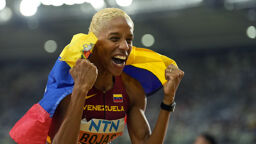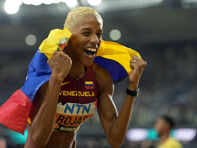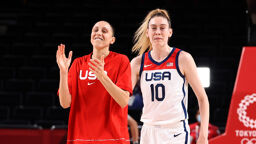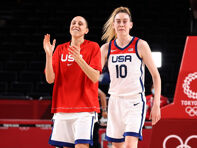CORVALLIS, Ore. — Kirk Walker stood before his Oregon State softball team and was finally going to reveal something about his personal life that his players had not known.
"I told them my partner and I were adopting and the information was on a website," Walker recalled about what he said to his players at the September 2005 meeting. Their coach was gay. And he just came out to them. Walker asked for questions. Their collective response, he said, was, "Oh, that's great, now tell us about the baby." They wanted to know everything about the process of Walker and his partner adopting a baby, and did not ask a single question about his sexual orientation.
"I wasn't completely surprised by it, and it was kind of a nice thing that it really wasn't a big deal, but deep down I felt I may get ramifications later," Walker said. "Two or three weeks later, we had an alumni game, and all the parents were around, and the parents were all excited by the adoption as well, so it was obvious the kids had talked to them about it and there were no ramifications. That's when I started to feel like this wasn't going to be a big deal."
If the news affected the Lady Beavers, it was only as a positive and they showed it on the field. Nine months later, the team made its first appearance in the College Softball World Series, capping the best season in school history.
Walker's revelation might not have been a big deal in Corvallis, but it is historic nonetheless. With his going public, he is the only known openly gay Division I college coach in the country. Walker, 42, knows other gay coaches, but none are publicly out (having spoken to the media or otherwise gone public). Outsports also does not know of any publicly gay coaches at that level.
"I am in a unique situation. I am a Division I coach, I am in the athletic arena and it is important that people speak and appear because it is important to the process of breaking down that barrier," Walker said.
"Virtually all my peers around the country know and I've seen no changes in the relationships. If anything, it made some of my peers who are also gay much more eager to seek me out and say something."
Walker's decision was motivated by the desire of he and his partner, Randy Baltimore, a team leader at an insurance company, to adopt a child. The men have been partners for 10 years and live in suburban Portland. In 2005, they were in the process of adopting with a surrogate mother and their pictures were posted on an Oregon adoption website. Walker did not want his players to find out about their coach's personal life by stumbling onto the website, so he made the decision to tell them.
"I actually cried when he said that," Natalie Johnson, a senior center fielder said, recalling the meeting. "It was really great and we felt special that he would trust us with that part of his life and we’re very proud and happy for him." If anything, the news may have made the team closer. " It gives everyone more moral support to be who you are and what you want to be and not hold it back," said sophomore catcher Stefanie Ewing.
Walker (photo right) and Baltimore (left) had their dreams fulfilled on July 12, 2006, when Ava Amor Walker Baltimore was born. Amor was the name chosen by the birth mother and the men agreed to honor her by keeping it as part of the baby's name.
Ava not only has two dads, she also gained 18 aunts. When the couple brought the baby on campus one day last fall, her bassinet looked right at home sitting outside Walker's office. Baby bottles and softball bats were a natural fit in this setting. On the field during a team practice on a glorious sunny and warm fall day, players would take breaks and go over to Ava and coo and play with her. A few yards away, Walker was calmly yet firmly instructing his charges on proper fielding techniques.
Walker has been a consistent success on the field, winning 462 games and two Pacific-10 Conference coach of the year awards in his 13 seasons at Oregon State. The Los Angeles native came to Corvallis after being as assistant coach at perennial softball power UCLA. Now regularly nationally ranked, the Lady Beavers reached the regionals of this year's college softball tournament. The coach, though, takes on a different persona when he's home and becomes dad.
"When he coaches, he's very much in control and he expects his athletes to perform at his peak levels," Baltimore said. "At home, I'm the one who's demanding."
Coming out process
Walker was not closeted prior to telling his team. His assistant coaches knew about Baltimore, as did members of the athletic administration. Walker had told his parents two years after he met the man who had become the love of his life. "As a coming out process it really was really relatively kind of slow," Walker said. "In the last five years, it was something I would never lie about or hide. It wasn't something I necessarily shared with everybody, but if anyone asked I would have said something about my partner." For whatever reason, none of his players ever asked about his private life.
Walker acknowledges that a gay man coaching collegiate women will have an easier time coming out than one coaching men.
"I can't imagine that it would be as easy coaching men and that's probably because of being in a potentially compromising position with an athlete," he said. "What's ironic is that there are many gay male coaches out there coaching men. I know several of them. … There's not this whole locker room staring-down-the-athletes, kind-of-checking-them-out thing going on. It's really about separating your life. It's your job coaching these athletes and then you have your private life."
Walker is a thoughtful and articulate man and it is obvious he has thought a lot about being gay in the sports world. He has read Outsports almost since its inception and only recently agreed to allow a profile of him written. He disputes any notion that gay men are not represented in sports.
"There's no reason why there is a less percentage of the gay population in sports than in any other part of life. I actually think that on the male side, there is a higher percentage of gay athletes" than society as a whole, Walker said.
"I think because sports is very traditional, macho, very masculine and if you do it very competitively, even at a young age, it's an escape, it's something you focus so much of your time and effort on, and you shut down much of your social life. This is true for gay or straight athletes. There are many athletes who don't do all the dating things, even if they're straight, because they're so committed with their time to their organized sport. So I think for someone that may be struggling with their sexuality, and they are good at athletics, they tend to dive head on commitment-wise to sports so they can be in a little bit of denial about their sexuality."
"I don't have the numbers, but if you use the 10% [of the population being gay] as a benchmark, I would imagine that in sports on the male side, the number of gay athletes is higher."
Walker also thinks that within sports, no discipline has a higher percentage of gay people (he has known of past Oregon State football players who are gay and also knows of current and ex-pro athletes). It's just that in sports like swimming or gymnastics there might be a "higher comfort level" with being gay, he said, leading people to believe more gays are in those sports. Despite progress, Walker still recognizes the motives for athletes to stay in the closet.
"It's still going to be a long and difficult road for a current professional athlete to make that step and it's probably not going to happen by his choice," he said. "As a professional athlete or a competitive college athlete, you give up a lot of your own self to be a part of the team, straight or gay. You give up a lot of your likes, dislikes and wants … and for a gay athlete [his sexuality] is the easiest thing to give up because he kind of wants to hide it anyway.
"It's easier for a gay male athlete who has questions about their sexuality to hide it better by being a committed and focused athlete because that immediately gives them a legitimacy that no one questions. There really is no other vein in this country any more that has that same [aura of masculinity] as sports does."
Since his announcement to his team, Walker has had no negative reactions and said he has not "felt anything different from any of the male athletes" he meets on campus. He's still Coach Walker to them. He also is willing to be the public face that says being openly gay and being a coach can comfortably exist.
"I am very comfortable being in the public eye," he said. "The fact that this is a big deal is OK with me and I'm comfortable being in that role."
Editor's note: Jim Buzinski traveled to Corvallis along with a producer for CBS News and freelance correspondent Paul Lombardi to produce a piece on Walker for CBS News on Logo. Comments from the players were taken from Lombardi's interviews with them. The TV report has yet to air.
Score weekly updates
Your go-to newsletter for LGBTQ sports scoops and major plays.







































